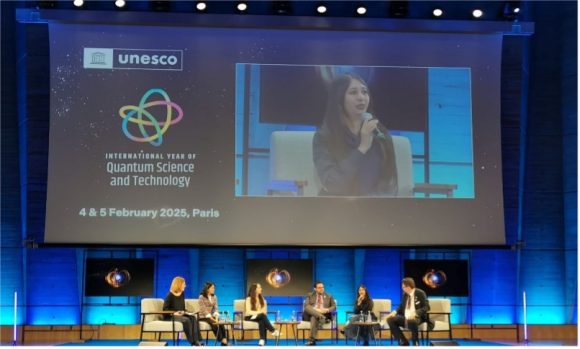[:en]
On the 4th and 5th of February, Quantum Physicists (Researchers), Ministers, and Industry Leaders convened at the UNESCO Headquarters in Paris to celebrate the Opening Ceremony of the International Year of Quantum Science and Technology (IYQ2025). Amongst the elites were Nobel Laureates Prof William Phillip, Prof Anne L’Huillier, and Prof Alain Aspect. I was honoured to be an invited speaker, represent South Africa in Quantum Science, and share the stage with many Nobel Laureates.

The opening ceremony marked the beginning of a year-long global initiative to recognize the groundbreaking achievements in quantum science and to encourage further innovation and collaboration in this transformative field. The International Year of Quantum Science and Technology is more than just a celebration of scientific achievements; it is a call to action for researchers, educators, policymakers, and industry leaders to come together, accelerate progress, and advocate for quantum science and technology. Quantum technologies promise transformative advancements in computing, communication, and sensing.
The various panels and fireside chats at the opening ceremony focused on the following themes: Shaping a sustainable future for global developments, Pushing the frontiers in quantum science and technology, Public engagement and education in quantum science and technology, the challenge of developing quantum at scale, Responsible quantum innovation, and the Ethics of quantum technology.
I was an invited speaker on the panel on Public Engagement and Education in Quantum Science and Technology which was moderated by Prof Emily Edwards (Duke Quantum Centre, USA) and joined by fellow panelist Prof Jacquline Romero (Australian Research Council Centre of Excellence for Engineered Quantum Systems, Australia), Dr John Donohue (University of Waterloo, Canada) and Ms Elisa Durney (CEO of Girls in Quantum, Chile).
The panel focused on the government’s role in fostering public literacy in quantum science, advising quantum strategy in countries where quantum efforts are not well established, building linkages and capacity for quantum information science on the African Continent, connecting with younger students and teachers to make quantum science feel relevant and exciting.
As I represented the African continent on the panel, I touched on South Africa’s Quantum Technology Initiative, which focuses on taking technology out of the lab and introducing it to technology demonstrators for commercialization. There is also a strong focus on including universities without a strong quantum background to increase quantum capacity in South Africa. I also focused on strategies for developing quantum capacity across the African continent. Many African universities and research institutions have well-established optics and photonics programs, which serve as a strong foundation for Quantum Information Science. A strategic approach would involve expanding curricula to incorporate quantum optics, quantum computing, quantum communication, and quantum sensing, ensuring a seamless transition from classical optics to quantum technologies. Furthermore, to grow the capacity of quantum on the continent, we need to focus on leveraging existing strengths, fostering strategic collaborations, and cultivating local expertise. Overall scaling capacity development of quantum information science requires a multi-pronged approach, including investment in infrastructure, academic training, curriculum reform, and national and international collaboration.
The key message identified from all the panels was the importance of education and inclusivity. Dr Lidia Brito, Assistant Director-General of Natural Sciences, UNESCO, closing remarks were insightful and further emphasized the need for inclusivity in quantum science and technology. All countries should have the opportunity to be involved. We must ensure that no country is left behind in this race to develop quantum technology.
Dr Yaseera Ismail
QuPhotonics Lab
Stellenbosch University
[:]
